The Susquehanna River Flood of March 1865 (Part 1 of 2)
Posted By Norman Gasbarro on March 6, 2014
This post begins a chronicle of the worst flooding on the Susquehanna River in history – at least at the time that it occurred. Unfortunately, this event had some effects on getting men and material to the war front – and men home from the war. Railroad tracks were submerged and bridges were damaged. While it seemed possible that the war was winding down and the Spring would bring on the last battles and skirmishes in the South, men from the Lykens Valley were being mustered into service at Harrisburg in the replacement company of the 103rd Pennsylvania Infantry, Company G. Their muster took place beginning on 9 March 1865 – just days before the river made its greatest damage. Some of the men barely made it out of the river valley to their destination on Roanoke Island, North Carolina. Most were delayed in their muster for about two weeks because of the floods. Those who made it out of the valley early had to read about the full extent of the damage in the newspapers – and wonder whether their homes and lands had been ruined .
The newspaper accounts begin on 8 March 1865.
———————————–
From the Philadelphia Inquirer, 8 March 1865:
THE ICE IN THE SUSQUEHANNA.
Baltimore, 7 March 1865 — The ice in the Susquehanna is moving very rapidly down the stream, but, as yet, no damage has been reported.
——————————–
From the Philadelphia Inquirer, 9 March 1865:
BALTIMORE.
GREAT FLOODS IN THE SUSQUEHANNA AND POTOMAC.
AN ICE BLOCKADE AT HAVRE DE GRACE.
Special Despatch to the Inquirer.
Baltimore, 8 March 1865 — The flood in the Susquehanna is higher and more violent to-day than heretofore. An immense body of ice is afloat, and in many places it is piled up twenty and thirty feet. No cars arrived from or departed for Philadelphia to-day. It is impossible for the ferry-boat to cross. The ice to-day was piled up over the piers of the new bridge, some of them being entirely obscured, and it is feared that they have been injured. The mails and passengers for the North are sent via the Northern Central and Harrisburg Railroad. Serious damages are reported along the river, some houses being swept off….
There is a high flood in the Potomac….
It is now raining heavily.
——————————-
From the Philadelphia Inquirer, 9 March 1865:
THE INTERRUPTION TO TRAVEL SOUTHWARD.
THE ICE-GORGE AT HAVRE DE GRACE.
Baltimore, 8 March 1865 — Travel northward is still obstructed by the ice in the Susquehanna River. We have reports of considerable damage along the river in the vicinity of Columbia and other points, but no particulars have been received. The ice is gorged below Havre de Grace, and there is no immediate prospect of the railroad ferry-boat being able to cross.
Above Port Deposit the river is comparatively open, but the water is very high. Parties have been able to cross there to-day in small boats.
A heavy rain is falling this evening and the warm atmosphere will, no doubt, soon force the ice out below and remove the present difficulty.
———————————
From the Philadelphia Inquirer, 9 March 1865:
ICE IN THE SUSQUEHANNA
The ice floating out of the Susquehanna River has lodged on the flats below Havre de Grace, stopping its further progress, and causing the river to be entirely choked up for some distance above the town. It is said that the ice opposite the town is thirty feet thick. Yesterday morning the Philadelphia, Wilmington and Baltimore Railroad Company made application for Government tugs to star the ice below Havre de Grace, and in the afternoon Captain Jennings, United States Quartermaster, ordered two of his heaviest tugs from Chesapeake City to perform that duty. They commenced the work last night, and it is expected that by this afternoon the trains will be resumed regularly.
——————————-
From the Philadelphia Inquirer, 18 March 1865:
GREAT FRESHET. THE RAILROADS SUBMERGED. The Bridges Swept Away. Great Destruction of Property.
Note: The full text of this article will be presented in the post tomorrow.
———————————
From the Philadelphia Inquirer, 18 March 1865:
FROM ANOTHER CORRESPONDENT.
Great Freshlet in the Susquehanna River.
Harrisburg, 17 March 1865 – The Susquehanna River is now the scene of a great and destructive —bet. Three bridges up the stream are reported to be carried away and coming down this way. Three bridges up the stream are reported to be carried away and are coming down this way. A number of families who reside on the island in front of this city, have been forced to leave their homes. The water is so deep in the river that the Harrisburg Water Works cannot pump the banks fronting on the river, and the streets are filled with citizens and strangers. The Pennsylvania Railroad track near Middletown and Columbia, is under water, and many other roads are in the same condition. The damage to property is very great, but no lives have been lost as far as known. It is the greatest rise in the river that has taken place since 1847. The water is now beating against the timber of the Cumberland Valley Railroad Bridge, which is usually fifteen feet above the level of the river. Various household objects, and even houses, have been floating down the stream all day.
——————————-
From the Philadelphia Inquirer, 18 March 1865:
TELEGRAPH COMMUNICATION SUSPENDED
All telegraph communication with Harrisburg ceased about midnight, the line being probably carried away by the flood. The last despatch received was to the effect that the water in the Susquehana River was thirteen inches higher than during the Great Freshet of 1846.
—————————-
From the Philadelphia Inquirer, 20 March 1865:
THE FLOOD ON THE SUSQUEHANNA. PARTS OF HARRISBURG SUBMERGED! Water, Gas, Rolling Mills and Manufactories Stoped. 400 FAMILIES DEPRIVED OF HOUSE AND HOME. GREAT DESTRUCTION OF PROPERTY. The River Higher Than Ever Before. BRIDGES AND HOUSES SWEPT AWAY. Railroad and Telegraph Communication Stopped – Canals Overflowed.
Note: The full text of this article will be presented in the post tomorrow.
——————————
From the Philadelphia Inquirer, 20 March 1865:
ADDITIONAL BY TELEGRAPH.
Special Despatch to the Inquirer.
The flood at Dauphin is very destructive. There are only eight or nine houses remaining at Rockville not under water. A large dwelling house, containing all its furniture, floated between the piers of the Pennsylvania Bridge at Rockville, where it is held. Stupendous stone walls along the Narrows is washed out. The Messrs Olewines, residing on McCormick’s Island, opposite Coxertown, barely escaped with their lives. Their horses and cattle were all drowned. The bank between the canal and river at Bainbridge for one mile has been entirely washed away. Some assert that they saw the body of a man in a military overcoat pass down the river to-day. Of course he could not be rescued, and must have been dead.
Later.
Harrisburg, 19 March 1865 — 8 o’clock, P. M. — The river is falling rapidly and the water is receding from the city. The fire companies are pumping water into the reservoir, which has been emptied since the stoppage of the engines at the water works.
——————————-
From the Philadelphia Inquirer, 21 March 1865:
THE FLOOD SUBSIDING – RESUMPTION OF RAILROAD TRAVEL.
Harrisburg, 20 March 1865 — The extraordinary freshets in the Susquehanna and Juniata Rivers are subsiding, the water failing rapidly. The damage to the Pennsylvania Rialroad is said to be very slight, and the road is back in working condition between Harrisburg and Pittsburgh. The eastward trains came thro0ugh on time to-day from Pittsburgh to Harrisburg. The damage done to the track that was overflowed east of Harrisburg, six miles, will be repaired by to-morrow evening. In the meantime the business of the road to and from Philadelphia and New York is passing over the Philadelphia and Reading Road. The Cumberland Valley Bridge has been repaired and the trains of the Northern Central Railroad, between Harrisburg and Baltimore, are passing as usual.
———- Thomas A. Scott, Vice President of the Pennsylvania Railroad Co.
——————————
From the Harrisburg Weekly Patriot and Union, 23 March 1865:
THE GREAT FLOOD
Special Despatch to the Inquirer.
Harrisburg, 20 March 1865 – The Northern Central Railroad’s telegraph line is repaired as far as Sunbury and in working order. The news from the north is important. Three spans of the Williamsport Bridge, over the Susquehanna, were swept away. One span of the Northumberland Bridge was also swept away, besides a large number of creek bridges. At Sunbury, the damage is said to be greater than here. The river bank, fifteen feet high, has been washed away. The Northern Central Railroad will soon be in working order again.
A Soldier Drowned
A soldier, named James Ott, was found drowned at Middletown, yesterday, after the flood had somewhat subsided. He has been on furlough home for fifteen days, having just attended the funeral of his wife, in Lancaster City. He had tickets from Lancaster to Washington, D. C. His furlough was signed by John France, Second Lieutenant Commanding. It is supposed that as he missed connection at Middletown, on his way to Washington, he concluded to work his way to Harrisburg, on foot, but was carried under by the current while attempting to cross a flooded district.
——————————–
News articles are from the on-line resources of the Free Library of Philadelphia.
——————————
This post continues tomorrow with the text of the articles describing the significant damage caused by the Great Susquehanna River Flood of 1865.
 ;
;

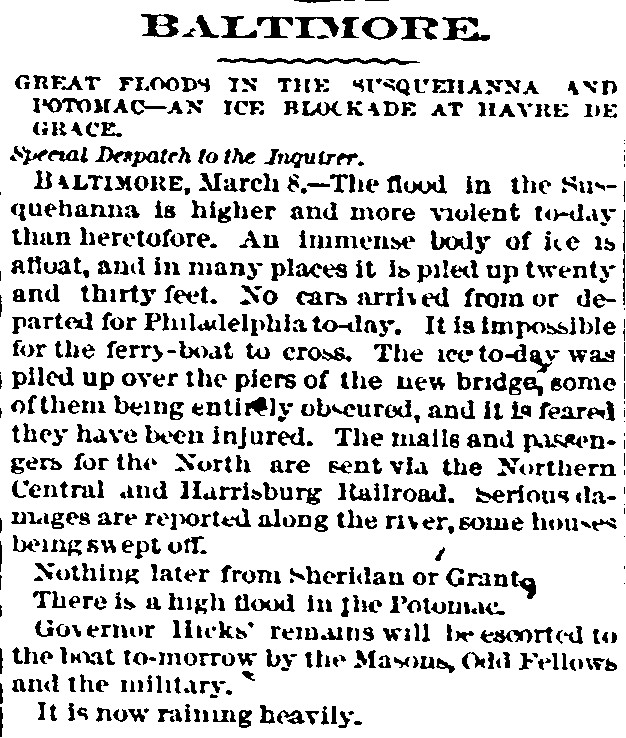
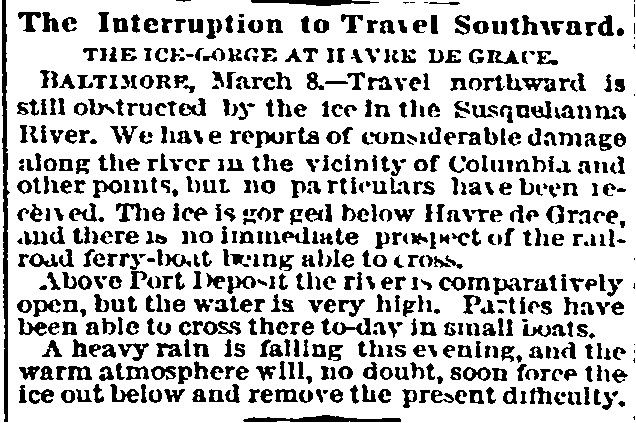
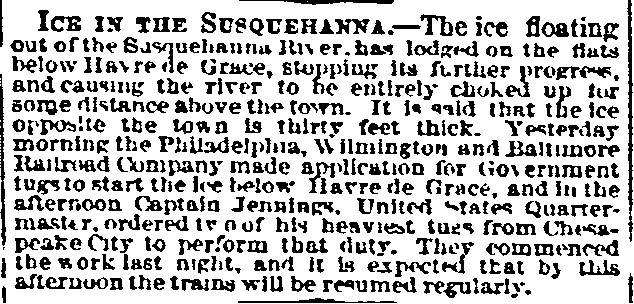
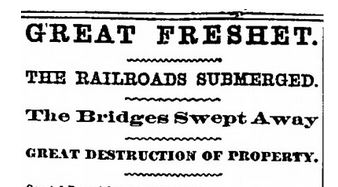
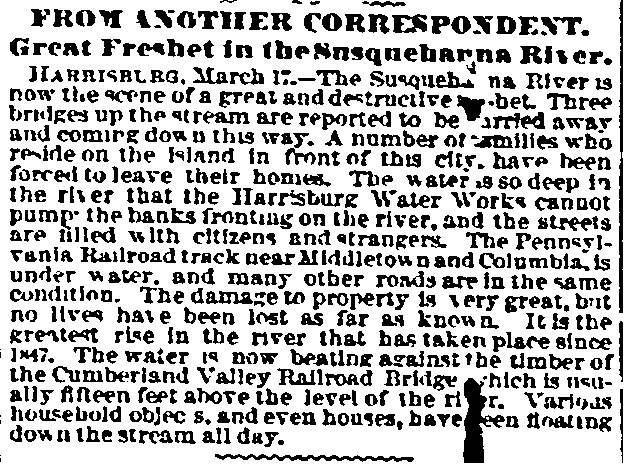

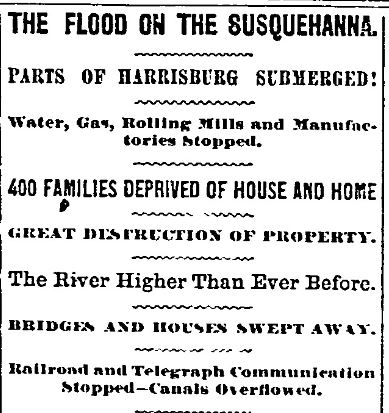
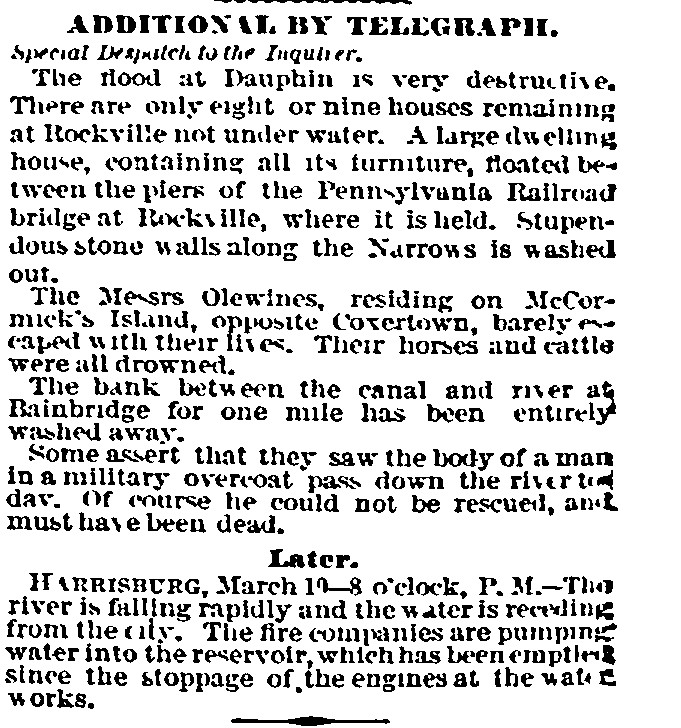
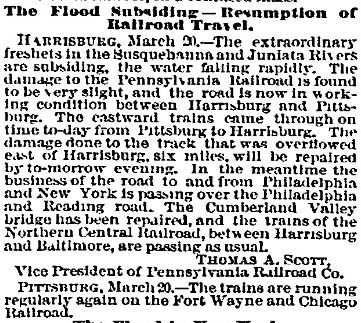
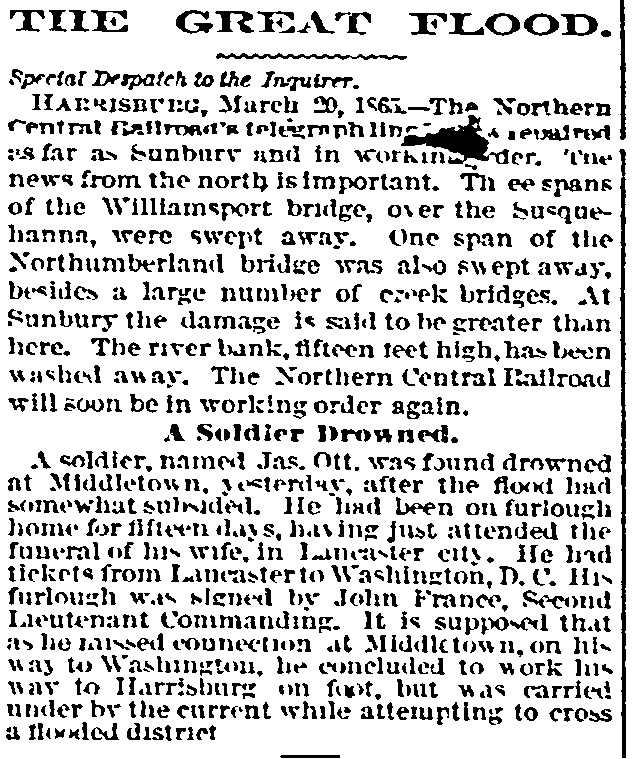


Greetings Norman. Found your post when doing a search regarding Susquehanna ferries that may have been running in April 1865. I am doing research for a book I am writing about a Confederate spy.
Where ferries, particularly McCall’s Ferry, up and running by April 14th 1865?
Danka!
Brian
[…] We have some choice. Some is in favor to go to North Carolina and some to West Virginia. And also the [Susquehanna] river is very high. It looks like an ocean and they say houses and parts of bridges went down the […]